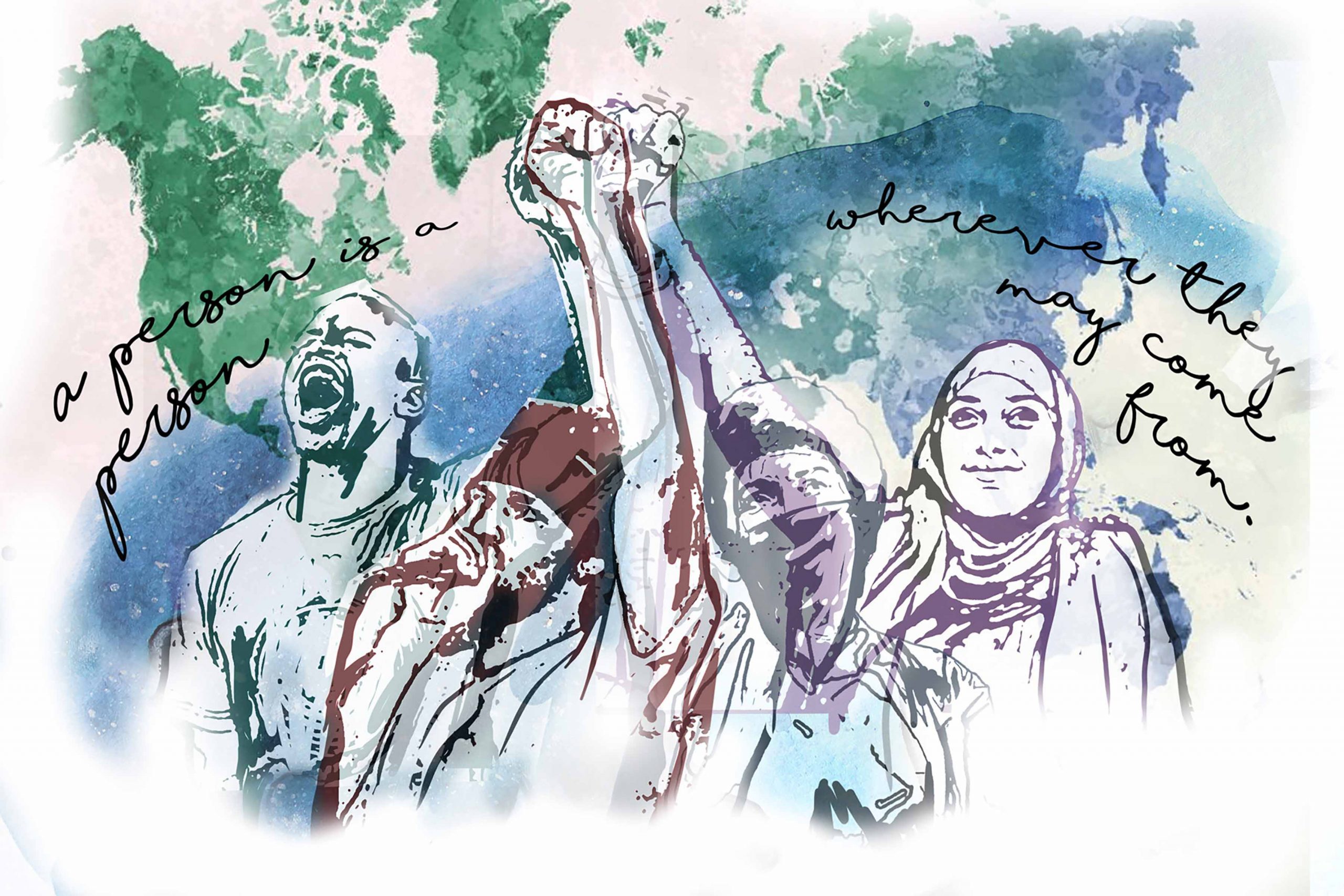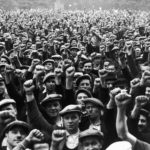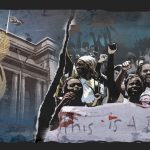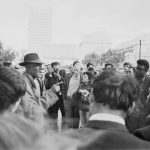Thinking Freedom
The Transnational Institute in conversation with Michael Neocosmos about power and emancipatory politics in Africa.
Author:
14 December 2018

Transnational Institute: How would you define counter-power? How does it relate to emancipatory politics?
Michael Neocosmos: I don’t think we should make power the starting point for thinking emancipation, particularly a binary notion of power. Whether you are talking about power or counter-power, you are starting from an idea of people’s interests and identities rather than from an idea of universal emancipation. And you end up talking about states and how we relate to them rather than defining human universality in our own terms.
Of course, power is always involved in the arenas and sites where politics takes place. I am concerned, however, that once we use categories of power, even if it is to think about a different way of addressing power, we end up using words and thinking through categories that are not helpful because they are categories through which the state itself thinks. Given that an egalitarian state is an oxymoron, a clear impossibility, any thought of universal equality must attempt to think outside hegemonic (i.e. state) categories.
Our starting point should be that people think, and that collective thought can begin to propose an emancipatory future. Drawing on the work of Alain Badiou, Sylvain Lazarus, Jacques Rancière and others, if we start from the assumption that anyone can think, what do we mean?
Related article:
We can’t assume that people’s thoughts are simply a reflection of their social conditions. We can’t assume, for example, that workers are only interested in levels of pay or working conditions, or that women are only interested in families, households or gender relations. Yet this is the overwhelming focus of thinking from within the social sciences, whether on the left or the right. It is assumed that people do not think outside or beyond the limits structured by their social location or place.
What’s more interesting is that in particular conditions of struggle, people sometimes collectively think beyond their interests, beyond place. They think and act a certain kind of equality, a certain kind of universality.
That is what emancipatory political thought consists of, this is where it is located – otherwise politics is just reacting to interests and identities. It’s fundamental today that we think beyond identities, otherwise we will end up killing each other. Wars, particularly nuclear ones, are a distinct possibility today.
TI: What does emancipatory politics look like?
MN: I think that such a politics is always founded on some idea of universal humanity, equality, justice and dignity. These are the requirements for human emancipation. People don’t necessarily think in those terms but they have the capacity to do so. If we don’t recognise this, we won’t see it when it happens.
We will not see it because we expect people’s thinking to conform to our pre-existing theoretical categories. If it doesn’t, we assume that people are simply wrong. We must stop thinking along these lines.
Members of Abahlali baseMjondolo, the Durban-based shack-dweller movement, express this best when they say: ‘A person is a person wherever they may come from.’ They base their politics on this idea when they confront xenophobia in South Africa.
Related article:
Emancipatory thought amplifies what people have in common rather than what differentiates us. It embraces universal justice where everyone must be treated in the same way – equally and with dignity. This includes directly addressing the social hierarchies made possible by a social division of labour. There is no excuse for paying me, a university professor, that much more than a street cleaner.
This is very different to state thinking, even though the Western liberal state adheres to some idea of a universal ‘Man’. We all know that this idea of the universal is false because it applies only to certain people while the majority of men, women, children, particularly those of darker skin, are excluded, colonised and oppressed. Colonialism, with its attendant racism, exterminations and genocides, was founded on such a flawed universalism. This is now well known.
TI: How is this emancipatory politics manifested?
MN: It must be understood that the idea of universal humanity is rarely placed at the centre of politics. This happens only at particular times. It is not a universal feature of popular rebellions, but the fact remains there is always a certain pressure towards equality when people themselves decide to rebel collectively against their systematic exclusion from a social system, which today is unfettered neoliberal capitalism.
Whether we look at the African slaves’ fight for freedom in 1791 in what is now Haiti; whether we look at national liberation struggles in many African countries from the 1950s onwards; or when we look at more recent struggles such as in South Africa in the 1980s and even more recently, we can observe elements and ideas of universality combined, in various extents, with particularistic ideas that defend interests.
Related article:
In Haiti, Toussaint Louverture, perhaps the most well-known figure associated with that revolution, did not fight in order to replace white racism with black domination. The idea was to fight against the ownership of people as such because this practice was inhuman.
Toussaint Louverture helped successfully lead the only slave uprising (in 1791) that created the first independent post-colonial state that was also free from slavery. When Frantz Fanon talks about the emancipatory content of ‘national consciousness’ during the liberation struggle in Algeria in the 1950s, he was not talking nationalism, he was stressing the fact that there cannot be freedom for humanity if some peoples are colonised and subjugated by others. It is as simple as that.
When people in South Africa fought for ‘People’s Power’ in the 1980s, they did not exclude foreigners as is often the case today. The idea of political exclusion is one which is foundational to capitalism, as Marx clearly noted.
It is sometimes asserted that politics is concerned with identifying an enemy. Although this is clearly the case, politics also involves creating or forming a political community, a unity of the politically excluded, hence of necessity it must involve some idea of working together under conditions where all, without exception, are entitled to speak and think. As a result, it broaches the idea of universality. In any case, without achieving unity, the enemy cannot be adequately confronted!
TI: What can we learn from Africa?
MN: I would prefer to talk of Africans rather than of Africa as such. ‘Africa’, like ‘Europe’, is implicitly identified with its representatives, with power. Africans must obviously be considered human beings like everyone else, capable of thought and, as Amilcar Cabral argued, people capable of making history.
One of the most important revolutions of the 18th century, the Haitian Revolution (which is effaced in the history books in favour of the American and French revolutions), was led by Africans (people born in Africa) and went further in its thinking of the human than the French Revolution because it recognised the universal idea that no one should own anyone else as property. The French revolutionaries vacillated on this issue while the American ‘founding fathers’ were directly involved in slavery.
It is critical that we break out of the notion of seeing Africans as victims, rather than as agents, of history. During the colonial period, Africans such as Patrice Lumumba were definitely seen as agents of history but by the late 1970s, they were more often seen as its victims. Africa was portrayed as a continent of famines, crises, poverty and underdevelopment in which NGOs and state interventions were needed as saviours. What could be more neo-colonial than this perspective?
Related article:
You can see this reflected in South Africa in the Truth and Reconciliation Commission. While it was very important for reconciling opposing elites, it ended up turning those who had been fighting for freedom into victims and supplicants of the state. This view can also be seen on the left, where it is believed to be sufficient to account for continental problems as a consequence of Africa having been colonised. It ends up reinforcing a narrative that Africans are incapable of making history.
TI: In your book, you write about your experiences in South Africa’s movements guiding your thinking on this …
MN: I come from and my thinking is firmly grounded within the Marxist tradition. I was involved in supporting the underground ANC struggle against apartheid. In the 1980s, South Africa experienced a mass popular movement that attempted to enable people to gain some control over their daily lives.
During this period, roughly 1984 to 1986, politics was thought of in a particular way. It wasn’t party politics because all popular parties were banned; these movements were quite spontaneous and took over or attempted to transform many state functions in urban townships: transport, cleaning campaigns, schooling, popular justice, self-defence, and so on.
These should not be idealised, as violent excesses did take place, yet at the same time people acquired the capacity to control their lives collectively and open vigorous debates could take place free from state control. Popular inventiveness was enabled and crime virtually banned from many townships. This was known as the movement for ‘people’s power’ – the term originating in the Philippines during the struggles against the Marcos regime.
From 1987 onwards, however, the state locked up many militant activists and removed the leadership from any ability to organise. As a result, nationalist politics became gradually more coercive, less democratically based. The ANC had no organisational presence in the country to speak of, although its prestige was enormous and its brand of nationalism was dominant. It was uniquely an organisation in exile, hierarchically organised as a political party and thinking in militaristic terms. It engaged in various diplomatic initiatives and in organising a largely ineffective guerrilla campaign.
From the late 1980s, various popular organisations began to regularly visit the ANC headquarters in the Zambian capital, Lusaka. Gradually, rather than being self-empowered and self-organised under their own forms of decision-making, there was a shift to listening to instructions from the ANC in exile.
After 1986, there was a distinct move away from bottom-up to top-down politics, from popular politics to state politics.
Related article:
In other words, there was a distinct move away from popular politics to state politics. This came at the same time as the arrival of NGOs and foreign aid organisations that further encouraged this process. People started thinking politics in terms of power: how to fill posts, how to have majority support, how to dominate committees and eventually government.
Democratic decision-making processes had frequently used a system of delegates, whereby people were delegated to represent organisations then come back to report, a system that was particularly common in trade unions. This system gradually fell by the wayside as ‘report-backs’ were less frequently used and delegates were replaced by representatives. It amounted to a process of depoliticisation, represented at its height by Nelson Mandela, who addressed protesters with words such as: ‘Please be patient, give us time to act on your behalf.’
This kind of politics had the effect of systematically demobilising people and led politicians to think they represented people, speaking on their behalf and replacing what the people were actually saying with their own ideas.
As Abahlali baseMjondolo eventually learnt to say: ‘Don’t speak for us. Speak with us.’ This idea must be at the core of all relations between popular movements and those in power.
Related article:
The process South Africa has gone through to where we are today has never been explained except as betrayal. That’s a simple descriptive statement of what happened; it does not constitute an explanation.
In my work, I wanted to understand how we can construct and sustain a politics that is democratic, popular and which can appeal to everyone. The works of French theorists such as Alain Badiou and Jacques Rancière, for example, attempt to think politics in its own terms, not by reducing it to society, the economy, the development of history, or whatever. Through the use of their theoretical insights, and through my study of African movements, this led to the ideas in the book.
This is an excerpt from a longer interview, first published by the Transnational Institute.
In 2017, Neocosmos’ most recent book, Thinking Freedom in Africa, was awarded The Frantz Fanon Award for Outstanding Book in Caribbean Thought by the Caribbean Philosophical Association.






